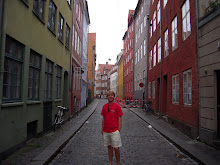Monday, January 12, 2009
How does film in general affect the way you see the world?
In Walter Benjamin's "The Work of Art in the Age of Mechanical Reproduction", Benjamin quotes Severin-Mars as saying: "film might represent an incomparable means of expression". Though this statement might seem incredibly bold, after watching "Amelie" and "Fight Club", the claim seems legitimate. These two films stretch the boundaries of film itself and show how much one can actually do within the medium. Benjamin talks at length about the future possibilities of film, and he would be happy to see the advances made as evidenced by these works. In "Amelie" for example, the power of the imagination is so fully and gloriously expressed throughout the film. Amelie's desk lamp comes alive, and clips of lovers across the city of Paris climaxing are shown as Amelie ponders the question on her roof. In "Fight Club", the infusion of the character of the Narrator and the influence of his alter-ego Tyler Durdan are expertly shown and thematically expressed using techniques that only film could capture. Blips of Tyler appear every so often on the screen before he actually appears in a seemingly human manifestation. In what other medium could a mental creation of an alter-ego be so powerfully expressed? When Tyler is revealed to be just that, a figment of the narrator's imagination (or, arguably, his actual self), Fincher returns to previous clips (now devoid of Brad Pitt's Tyler) and reveals to the audience how he had tricked them and how it all makes sense. Both these films expertly exploit the technological advances of the day and use them to reinforce the core narratives of their stories.
Subscribe to:
Post Comments (Atom)

No comments:
Post a Comment